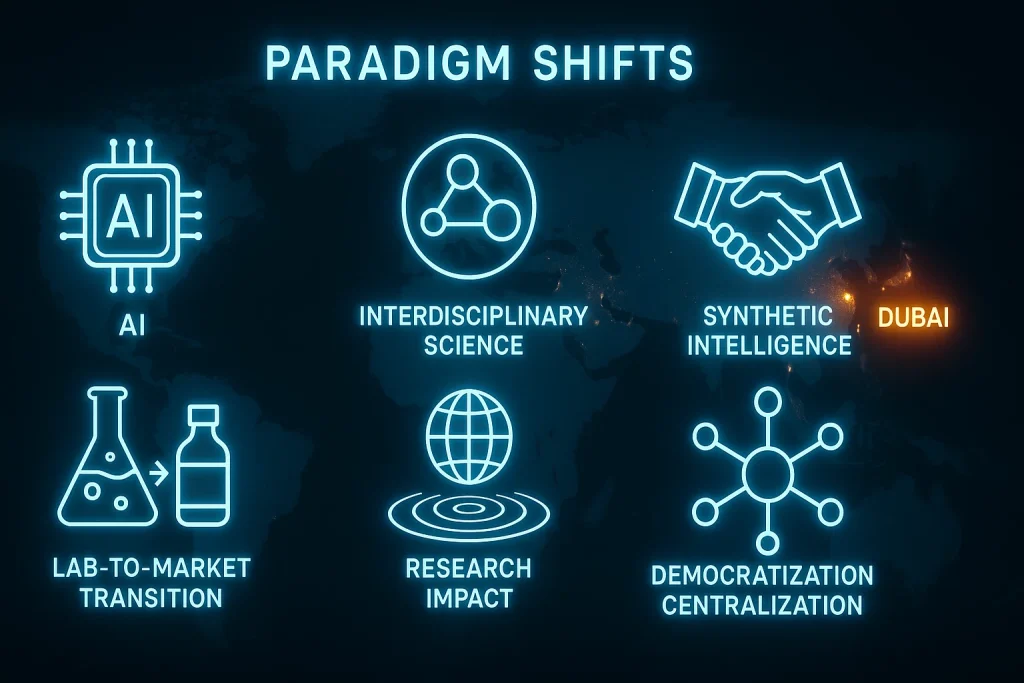Six Paradigm Shifts Redefining Global RDI — How Governments Can Shape the Future of Innovation
The 21st century has made one truth undeniable: innovation is the currency of progress. Nations that lead in research, development, and innovation (RDI) are not only more competitive, but also better prepared to tackle the defining challenges of our time — from climate change to food security, from digital disruption to global health crises.
According to a landmark report by Boston Consulting Group (BCG), in collaboration with the Dubai Future Foundation (DFF) and the World Governments Summit (WGS), the global RDI ecosystem is undergoing six paradigm shifts that demand governments rethink their strategies.
These shifts are not abstract theories. They are real forces shaping how knowledge is created, shared, and applied. For the GCC — and the UAE in particular — they represent both a challenge and an opportunity to build a knowledge-based economy, powered by science, AI, and cross-disciplinary collaboration.
The Six Paradigm Shifts
1. Interdisciplinary Innovation
The walls between disciplines are collapsing. Biology merges with chemistry, materials science with AI, leading to breakthroughs like lab-grown food and nutrient-delivering smart clothes. Governments must encourage cross-disciplinary RDI funding and reward academic collaboration to accelerate such disruptive solutions.
2. AI and Big Data as RDI Engines
AI is not just a tool — it’s becoming a co-researcher. From virtual drug testing to predictive modeling, AI can cut timelines from decades to years. But with this power comes ethical concerns: Who owns AI-generated discoveries? How do we secure sensitive datasets? Governments must establish regulatory sandboxes to experiment with policies while enabling innovation to flourish.
3. The Rise of Synthetic Intelligence (Human + AI)
We are entering an era of synthetic talent — where human creativity partners with AI computation. This synergy has already earned global recognition, with AI-assisted research even contributing to Nobel Prize-winning work. Education systems must urgently teach students to use AI as a partner, not just a subject.
4. Faster Lab-to-Market Transitions
The COVID-19 vaccine proved that decades of foundational research can translate into real-world impact in record time. Today, there is rising demand for rapid commercialization of research while still funding long-term, basic science. Governments must strike this balance by providing patient capital and incentives for private sector engagement.
5. Beyond the Impact Factor
Traditional research metrics like citations are no longer enough. The question is not just “how many times was this cited?” but “what impact did this create in society?” Governments must adopt broader evaluation systems — valuing long-term knowledge, reproducibility, and even research that ‘fails’ but expands human understanding.
6. Democratization — and Centralization — of RDI
On one side, cheaper computing power enables individuals a
nd small labs to innovate. On the other, advanced AI and digital infrastructure remain concentrated among a few tech giants. Governments must bridge this divide with open-access data, public-private partnerships, and fair digital infrastructure, ensuring innovation remains inclusive.
Why It Matters for Governments
These paradigm shifts are not academic exercises — they determine national resilience. For the UAE and GCC:
Diversification → Investing in RDI reduces reliance on oil and accelerates a knowledge-driven economy.
Global Competitiveness → By leading in AI, biotech, and interdisciplinary innovation, the region can attract top talent and investments.
Societal Impact → From smarter healthcare to food security, RDI directly shapes citizens’ quality of life.
The UAE is already pioneering this future through the Dubai RDI Program, the RDI Grant Initiative, and regulatory sandboxes that test and scale cutting-edge innovation.
Looking Ahead
The report is clear: governments must evolve from being funders to becoming ecosystem architects. That means nurturing talent, building ethical AI frameworks, incentivizing private sector RDI, and redefining what success looks like in science.
The six paradigm shifts are not distant possibilities — they are today’s reality. The nations that embrace them will not just adapt to the future; they will lead it.
FAQ
Q1: What is RDI and why is it important?
RDI stands for Research, Development, and Innovation. It drives national competitiveness, resilience, and solutions to global challenges.
Q2: What are the six paradigm shifts in RDI?
Interdisciplinary innovation, AI & big data, synthetic intelligence, lab-to-market acceleration, redefining impact, and democratization of RDI.
Q3: How does AI change RDI?
AI acts as a research partner, accelerating discoveries, but also raises ethical and regulatory concerns.
Q4: Why is RDI critical for the UAE and GCC?
It supports knowledge-based economies, fosters diversification, and strengthens global competitiveness.
Q5: What role do governments play?
Governments must provide funding, regulatory frameworks, talent development, and infrastructure to shape a dynamic RDI ecosystem.




![Khalifa Al Qama[7]](https://www.techandtech.tech/wp-content/uploads/Khalifa-Al-Qama7-585x878.jpg)

